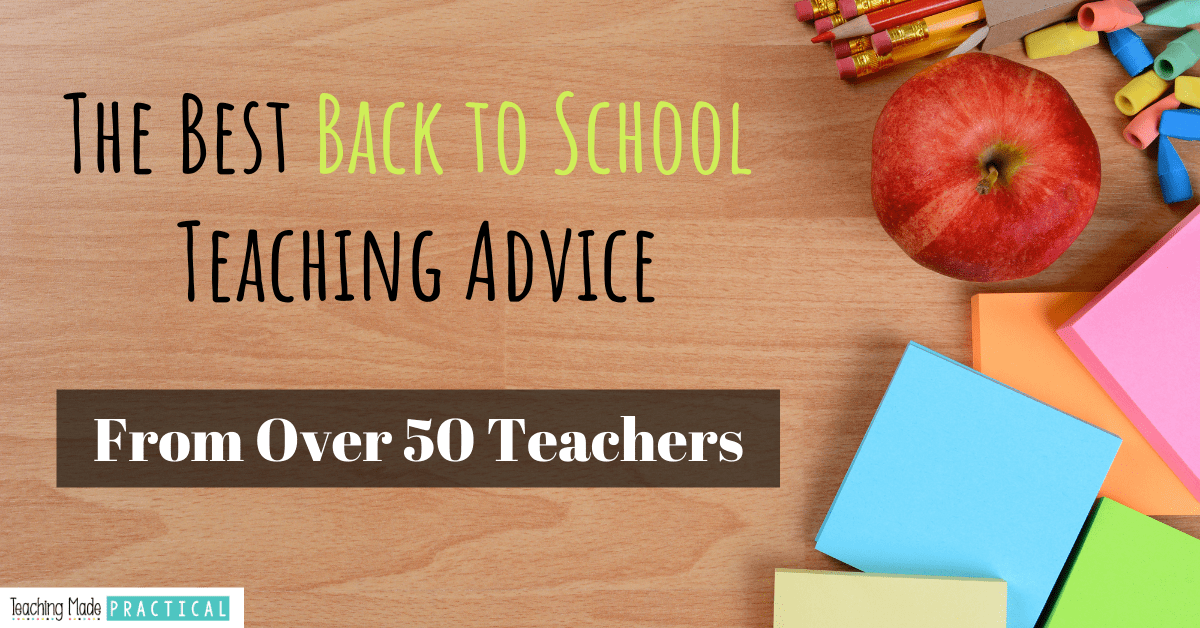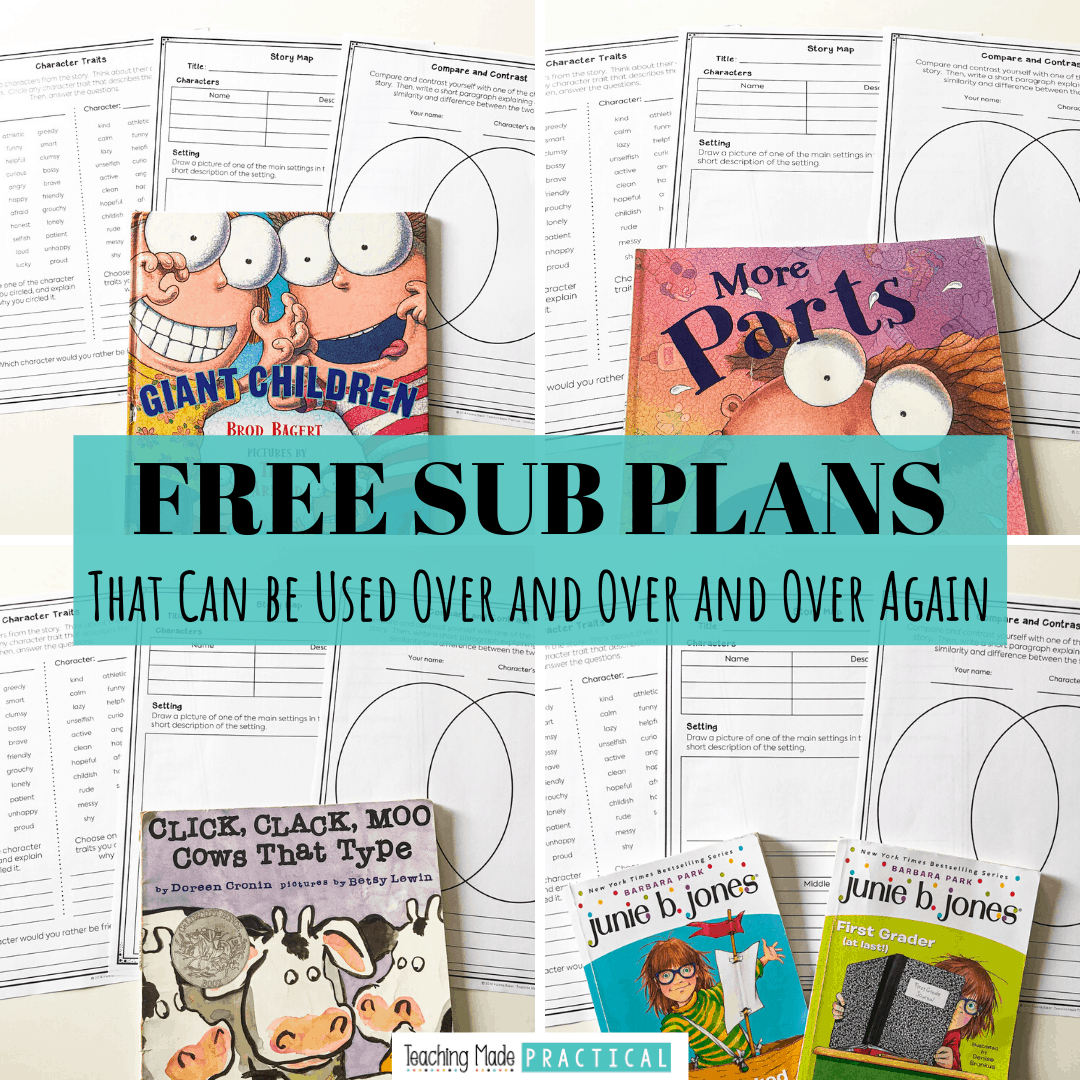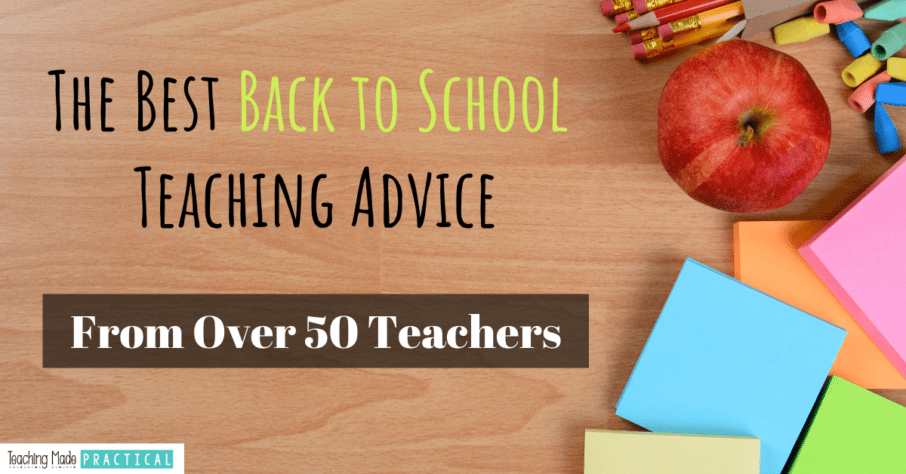
Only teachers can really understand the complexity of teaching 3rd grade, 4th grade, or 5th grade students. Fellow teachers understand our joys and our struggles. Only teachers are truly qualified to offer back to school teacher tips.
So, I surveyed hundreds of teachers, asking them to share a back to school tip that would help a teacher out during the school year. The teachers could share a tip about ANY aspect of teaching, but the majority of teachers stuck to 6 main topics. This shows you how important these aspects of teaching are to a good school year!
The 6 main topics that teachers gave tips on were: classroom management, building a positive classroom community, time management, grading, parent communication, and taking care of yourself.
I chose the most helpful tips (from more than 50 teachers!) and organized them below. Some of the teachers requested to remain anonymous, and I respected that wish. Before you head back to school, check out these tips!
Back to School Classroom Management Tips
Good classroom management can make or break a school year, so it's no surprise that many teachers gave tips about classroom management and disciplining students. Many teachers stressed the importance of starting off strict at the beginning of the year and practicing procedures and routines over and over again. (Check out 17 fun ways to review classroom procedures here.)
-
"Start off strict the first few weeks of school so students learn expectations, then you'll be able to have fun the rest of the year because your classroom will be under control!" -Cassidy Vera, 5th Grade Dual Language
-
"After you discipline a student let it go. Don't carry over to the next day. Treat every day as a new slate for each child. Everyone has a bad day sometimes and nobody likes to be reminded of it." -Anonymous
-
"Be consistent. Students need structure and to know they can trust you." -Anonymous
-
"Create or revise your list of classroom procedures and think of fun ways to teach them (you can check out these classroom management ideas)." -Anonymous
-
"Don't take student behavior or a parent misunderstanding personally." -Anonymous
This free classroom procedures checklist can help you figure out what procedures you need to consistently practice in your 3rd, 4th, or 5th grade classroom.

-
"Commit a small corner of the board for first thing in the morning routines, directions and assignments. I learned early on that if I didn't write down exactly what I wanted the students to do, where to place homework and papers from home, etc. I would be repeatedly answering the question, 'What are we supposed to be doing?'" -Angela Rochelle, 3rd grade
-
"Establish your expectations right from the getgo. Be fair, but firm. And follow through with the consequences you set. Make sure your students know that you mean business and any inappropriate behaviors will be addressed. Setting this part of your management up in the beginning will greatly improve how the rest of your school year will go." -Danielle C., 6th grade
-
"Use the first weeks of school to establish routines and assess. It seems like you may be wasting time, but it will definitely pay off in the long run!" -Anna Barefoot, Resource PreK-5
-
"I use poker chips to help make some of my students aware of behaviors like blurting or being out of their seats. They pay me a chip each time they have the behavior. If they don't use all their chips in one day, they earn a sticker. Once they earn x number of stickers they get a reward. The student and I work out how many chips he or she'll have for that day ahead of time. I stay most with 15-20 and over a few weeks go down to 5-8. Works like a charm!" -Anonymous
Fun, No Prep Halloween ELA Activities! Includes:
- Halloween Fun Packet
- History of Halloween Reading Passage
- Monster Descriptive Writing Activity
- Spooky Figurative Language
- Bats Reading Comprehension and Snowball Fight
Building a Positive Classroom Community Tips
Although this section could also probably be considered Classroom Management, there were so many teachers stressed the importance of building a classroom community that I had to include it as its own section.
Many of the teachers below emphasized the importance of greeting each child daily in order to build relationships, which is a change that I made to my morning routine that made a huge (positive) difference!
Before you head back to school, make sure you have a plan in place for building a positive classroom community. It can be as simple as regularly facilitating positive conversation between your students with questions like these.
Or, try out some of these other ways to build a trusting classroom community.
-
"Make a personal connection with each student each day (greet them at the door every morning - handshake- then a high five before they leave to go home)." -Anonymous
-
"Greet each student every day - even the ones who irritate you on a regular basis!" -Anonymous
-
"Spend quality time at the beginning of the school year to create a classroom community and relationships with your students." -Anonymous
-
"Connect with each child by name and eye contact with something personal to build them up EVERY SINGLE DAY." -Anonymous
-
"Above all else focus on the building individual relationships with your students." -Anonymous
-
"Write notes to your students. It makes them feel special and maintains positive climate." -Anonymous
-
"Remember to cultivate kindness and love at the beginning of the year. It's the most important thing you'll do all year!" -Anonymous
These tips for cultivating a culture of kindness in the classroom might help you build the positive classroom environment you want.

Time Management Tips
If you don't use your time wisely, you won't be able to survive in education for very long. The teachers below gave back to school teacher tips for utilizing your students and parent volunteers, using your time wisely, and for letting go of things that you don't have time for.
A common back to school teacher tip was to make sure you are letting your students help! Sometimes assigning classroom jobs can feel like more trouble than it is worth, but there are systems you can easily set up that make classroom jobs a huge time saver in your classroom!
-
"...Something that has been really beneficial in my classroom (6th grade in an elementary setting) is that if a student can do it, it's their responsibility. I try to set up my classroom in a way that they know where all of the supplies are. If they need something, they don't ask me but go and get it. If we had a classroom system that wasn't working (there was an issue with our 6 classroom chromebooks) I had a set of students figure out where they could set them up and it would be more manageable. I asked their feedback about how we could make chromebook usage more fair for everyone. They came up with some great ideas, I saw what was important to them, and I watched them learn to be more independent and take care of things. The same was true for checking off root work (which was completion), passing back papers etc. If my students could do it, I had them do it. It saved me so much time and energy. Sometimes it wasn't quite what I wanted (like cutting out some game pieces for a science lesson), but usually in those cases it really didn't matter and I just had to lay my perfectionism aside." -Rachelle Tolman
-
"Be organized! Have a place for everything, and have everything in its place. Not only will it save your sanity (where is that math test, did I send those notes home, my meeting paperwork is somewhere) but will cut down on those micro-minutes that kids seem to take advantage of." -Charity Lawrence, 3rd Grade
-
"Be flexible. Do what you can, that's all you can do." Vicki Quisenberry, Special Education
-
"Spend time preparing for the next week so when you show up on Monday you are not frantic." -Anonymous
-
"Stay on top of planning, once you fall behind it’s twice as hard to catch up!" -Anonymous
-
"Use your parent volunteers!!!" -Anonymous
-
"Let students be responsible for the little tasks....I found I needed to be 'in control' of everything; then I finally started to let the students take control of some tasks in the classroom that helped free me up to work with individual students. They love the responsibility and I love the extra couple minutes." -Amy Hinds, Grade 4
-
"Let some of the control of certain things fall to the students (being responsible for cleaning up, keeping areas clean, marking off homework, filling out behavior forms)." Kimberly McGann, 3rd Grade
Back to School Teacher Tips for Grading
These are actually time management tips for grading, but since so many teachers shared tips for grading it became it's own section! It is easy to drown yourself in a pile of papers to be graded, so thinking about how you will handle grading papers ahead of time can save your sanity later.
Several teachers explained how grading with rubrics can be a time saver while also providing beneficial feedback, while others emphasized that you don't have to grade everything!
-
"1) Be selective about what you grade and give feedback on, as it can be overwhelming. 2) Checking off work or homework daily keeps the task small. (Consider it as a student job.)" -Erin Peterson, 2nd
-
"Don't let the grading pile up. It just gets overwhelming and your feedback and ability to change up your teaching gets too far delayed to make a difference." -Nicole, 4
-
"Don’t grade everything. I grade tests and I try to give feedback/grades on writing frequently. Other than that I either have students self check, partner check or use whiteboards so I can do a quick check before they erase and start over." -Kimberly Duarte, Grades 3 and 4
-
"Remember you don’t have to grade everything that students turn in. Wait for exit slips and observational ratings." -Anonymous
-
"Make grading simple - use codes, have students self grade, use written feedback instead of marks..most importantly, don’t grade everything and don’t be a worksheet giver!" -Anonymous
-
"Determine a 'best' time to regularly grade papers and stick to it!" -Gail Wentworth, Fourth grade
-
"Grade work together as a class. Give students a chance to mark answers wrong on their own paper and if they change their answer to the correct answer, give them a bonus point. (After you review all answer choices and talk about why each answer was correct/incorrect.)" -Anonymous
-
"Grade each essay only on the writing skill you’re currently teaching (conventions, focus, organization, etc.) Use a rubric to grade this skill. When reading the essays, I stayed focused on the criteria listed on the rubric and circled the appropriate levels. All that was left to do at that point was leave feedback comments." - Anonymous
-
"For homework, have students check their own as part of morning work, noting what they missed and why. Then turn to a partner and discuss what they missed. Not everything has to be graded by me. As long as students are learning, this is goal I need to keep in mind at all times." -Robin Sneed, 4th Grade
-
"Don't wait...put in assignments and grades as soon as you can. Find a system that works for you...maybe it's taking 5 minutes during lunch or staying 5 minutes after school to plug in grades, write emails, or update assignments. You'll feel better knowing that it won't be building up and your students' parents will feel better too seeing upcoming assignments and grades." -Anonymous
-
"Remember that positive feedback gives courage to keep trying and constructive feedback provides students with goals." -ML Voelz, 6th grade
Parent Communication Tips
Your relationships with parents can have a huge affect on your school year. Below, teachers give tips for effective parent communication. You will see a common theme - most of the teachers emphasized the importance of informing parents of positive students behaviors (not just negative), and of building relationships with parents early on!
-
"Start early! Fill your parent bank with lots of deposits before trying to make any withdrawals!" -Anonymous
-
"Contact parents with a positive thought within the first couple of weeks. Keep parents informed." -Anonymous
-
"Start early make positive phone calls starting the first week of school." -Kevee Darts, 3rd grade ELA
-
"Call parents for positive reasons not just negative."-Anonymous
-
"Have open communication with parents on a daily basis. It allows for a smooth school year with little to no questions. I keep my parents updated on all the happenings in my classroom; especially academically and leave zero surprises! I have been thanked countless times for this." -Anonymous
-
"Don't take student behavior or a parent misunderstanding personally." -Anonymous
-
"Put in place a system of communicating both good and bad behaviors. Not just bad." -Anonymous
-
"Call every parent with a positive comment in the first two weeks. It will go a long way toward building rapport." -Anonymous
Teacher Tips for Taking Care of Yourself
- "Use a journal and every day write one positive thing that happened." -Anonymous
-
"Take a breath, then persist with what you CAN do and release what is out of your control. You cannot fight EVERY battle." -Anonymous
-
"Take care of yourself so you can better take care of your students." -Anonymous
- "Show grace. To yourself and others. When you fail, use it as an opportunity to learn and grow, and move on." -Anonymous

-
"Always stay positive and keep trying. Lean on each other when our jobs seem to frustrate us." -Anonymous
-
"When possible, collaborate regularly with a peer. Keep each other accountable when necessary. Support through challenges and celebrate successes. It is also important to have someone with whom you can confidentially vent. But....stay focused and positive!" -Anonymous
-
"Every day is a new beginning. If the previous day was horrible, you will get a fresh, new start the next day!"-Anonymous
-
"While it's nice to get ideas from others, don't judge yourself on how others teach." -Anonymous
-
"Don't be so hard on yourself, breathe, and ask for help." -Anonymous
-
"Do not hesitate to lean on your colleagues for advice and encouragement. It builds good professional relationships and collaboration benefits everyone involved. This includes our students!" -Tina, Grade 5
-
"I just finished my first year of teaching and the best advice I can offer is to make a teacher friend at school. Without someone who you can freely talk to about the good, the bad, and everything else, the school year will be really hard. Students need a support system, but so do teachers." -Anonymous
Other Back to School Teaching Tips
These tips for 3rd grade, 4th grade, and 5th grade teachers didn't fit very well into one of the section above, but they were too good not to include!
-
"Enjoy your job and your children. I have found that when I become stressed with demands put on teachers from those not in the classrooms, I become stressed and begin to lose the joy of teaching. I have to make sure that my top priority is my children and what is best for them. That changes each year because your students are not the same each year. You can't teach your children as if they are all the same because they have different needs. When I remember who I am really in the classroom for, I can begin to enjoy my job and my children more." -Anonymous
-
"I attended a conference last year and they talked about how our minds grow when we struggle and build connections when we make mistakes. Mistakes are part of the learning process. We expect students to learn from them and move on, continuously learning. I think as teachers we are the same, continuously growing and learning. Believe in yourself, forgive yourself when you make a mistake and keep improving yourself every day." -Machenzie - 5th grade
-
"Find the teacher at your school that is calmly and quietly rocking it and learn from them. Big and flashy is great sometimes but really dig in to learning from those veteran teachers that have figured out how to make a difference for kids without burning themselves out." -Anonymous
-
"Each day should be a reset for your students and for you. If you’re having a rough day, remember tomorrow has the opportunity to be better." -Anonymous 3rd
-
"Enjoy it! This job can be really fun if we let it be." -Stephanie Keller, 5th
Be sure and checkout these other helpful ideas for the back to school season!
Never Stress Over Sub Plans Again!

Make copies, find a fiction book, and you'll be ready for any emergency that comes your way!



